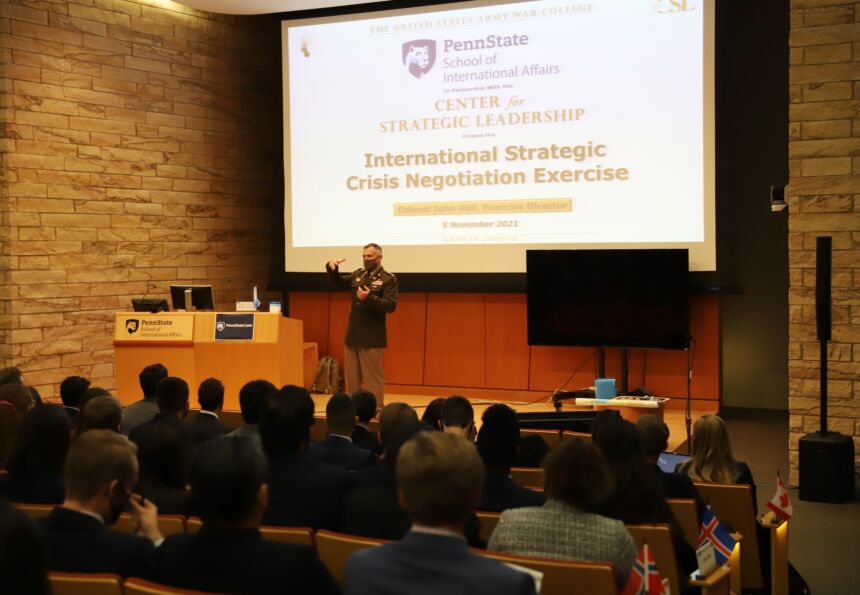November 09, 2021
Army War College Simulation prepares students for crises

UNIVERSITY PARK, Pa. – November 5-6, 2021, students in the Penn State School of International Affairs, surrounded by a former U.S. ambassador and current U.S. Army War College officials, experienced the tension of being a diplomat and working to resolve an international crisis—at the Army War College Simulation.
Each year, SIA Professor and former U.S. Ambassador Dennis Jett coordinates an international crisis simulation as a component of his core course on the foundations of diplomacy and international relations theory. The U.S. Army War College (USAWC), located in Carlisle, Pennsylvania, manages the details of the simulation in the form of its International Strategic Crisis Negotiation Exercise (ISCNE).
Experiential learning is one of the best ways for students to prepare for a career in international affairs. "The simulation with the Army War College is one of the most popular and important activities that students participate in while at the School of International Affairs," Jett said.
This year’s exercise focused on the Arctic region, with the students divided into nine teams. They negotiated the conflicting claims of the countries represented over rights to the resources in the Arctic region.
“It puts students into a situation that is very close to what a real-world, diplomatic negotiation is actually like,” Jett continued. “It is a very valuable, professional experience and it is fun for them to try out their negotiation skills in a complicated, international crisis.”
Second year SIA student, Abby Trzyzewski thought that everyone did a “great job.” She expressed that Russia and China showed “great leadership and really took a strategic, diplomatic, and creative approach.” She noted one student, in particular—Justin Baker, first-year, SIA student who acted as the Russian head of delegation.
As the one who had to do the negotiating, Baker not only used skills that he learned in class, but also from a source a little closer to home—his mother.
His mother always taught him that he could always get anything in life if he just listened and watched what others did. Baker and his team used this strategy during the simulation. Their goal: to listen and watch.
This Army War College simulation showed him a glimpse of why politics and government are so important and why people should pay attention to what’s going on in the world. “In politics, there’s not just one right answer or just one right way to make things happen,” said Baker, “but it does take cooperation and participation from many different sources.”
Overseeing the simulation were Colonel John Hall, communications officer, Major Chris Miller, and senior controller (and retired naval aviator), Cliffy Zukowski. Ultimately, the simulation was not intended to resolve the crisis, but it represented a chance for students to develop real-world skills that will translate to their planned career paths.
“By the second day, they were thinking strategically. They were working towards collective goals,” Trzyzewski said. “They were using [strategies] they learned in their classes! They were bonding with their mentors.”
Regardless of their specific roles in the exercise, students embraced the hands-on approach to education.
SIA’s emphasis on applied learning and professional development, in addition to building critical analytical skills in the classroom, helps prepare students for a successful career. SIA graduates have secured positions as Foreign Service Officers and embassy personnel around the world, but the Army War College exercise benefits students regardless of their intended career field.
“I chose the School of International Affairs because I want to enact change on a higher level,” stated Baker.
“Change happens from the top. I want to get into the government—into the Intelligence community to see how we can use intelligence to change the world.”
